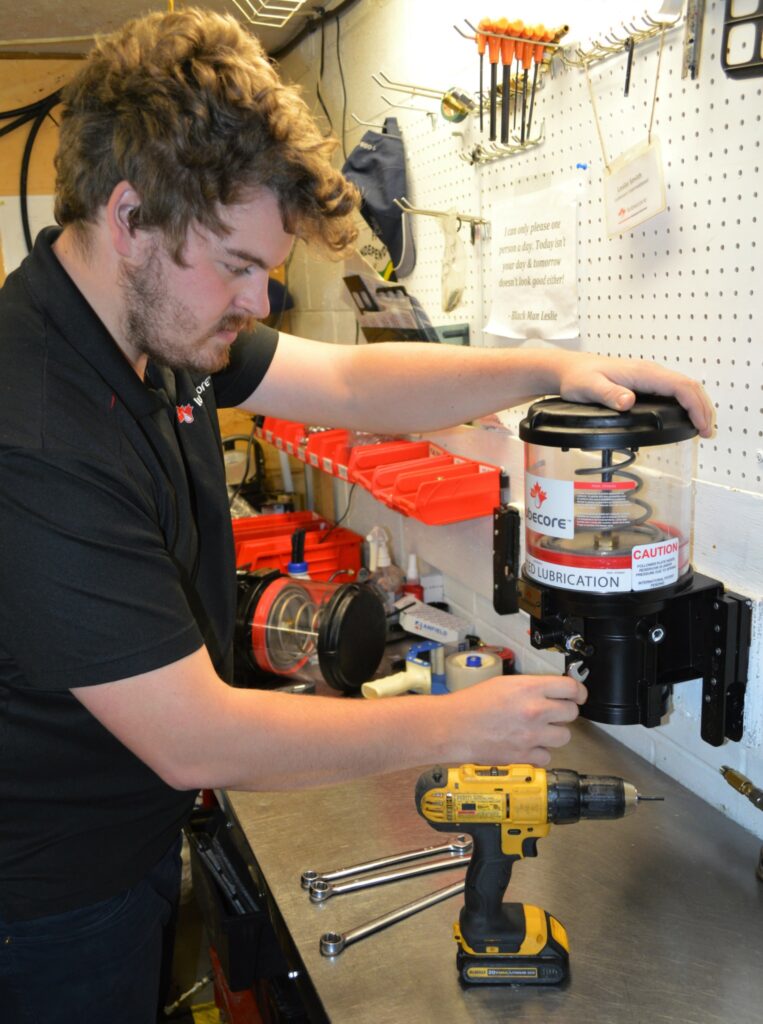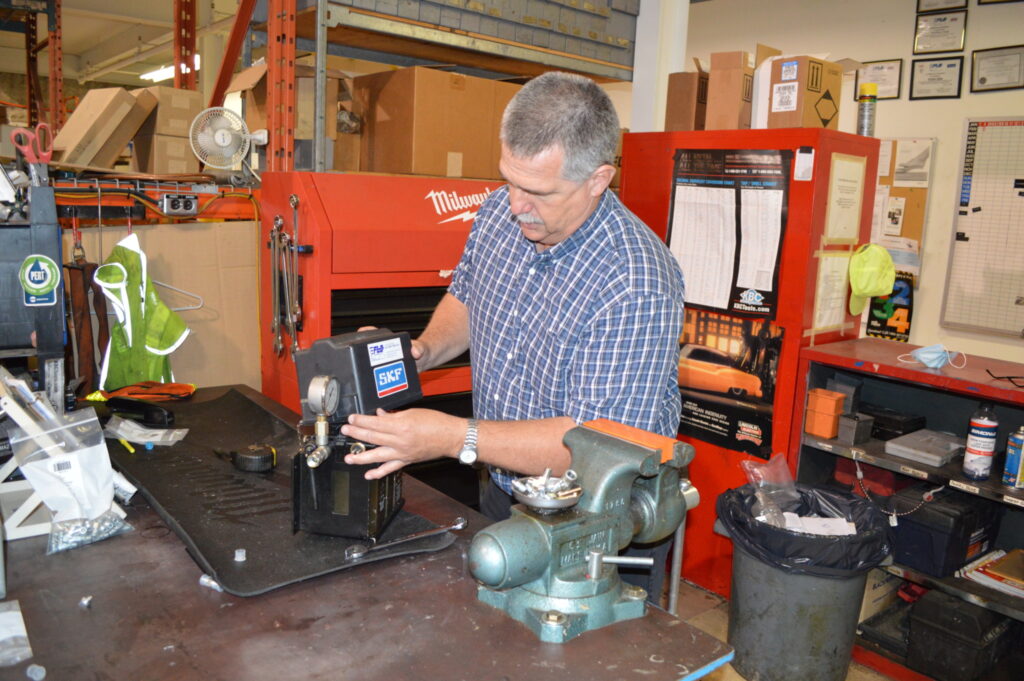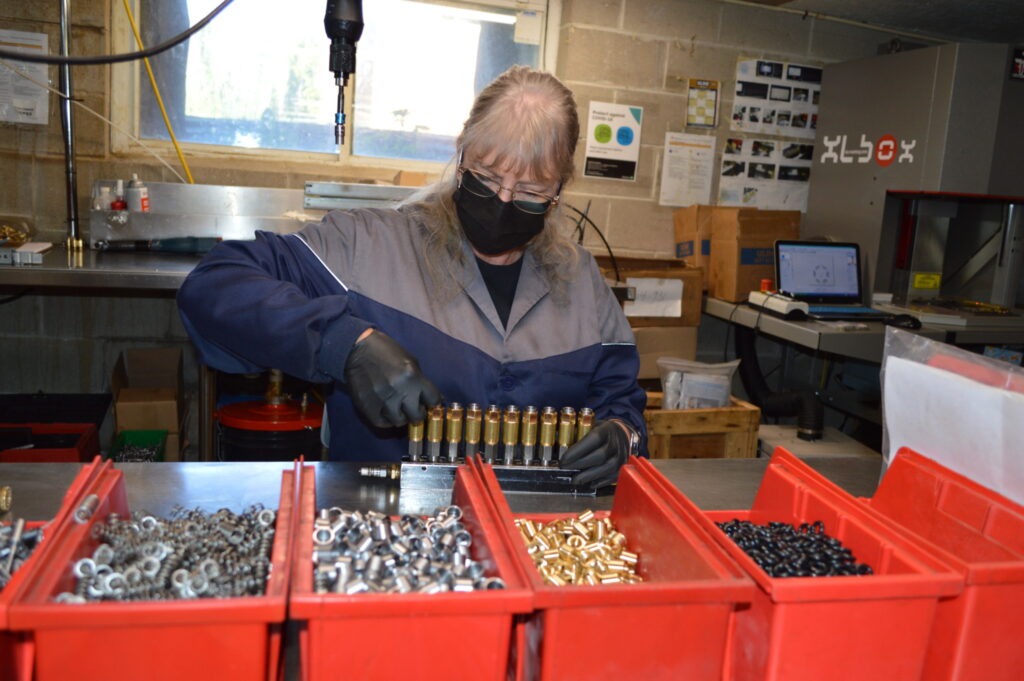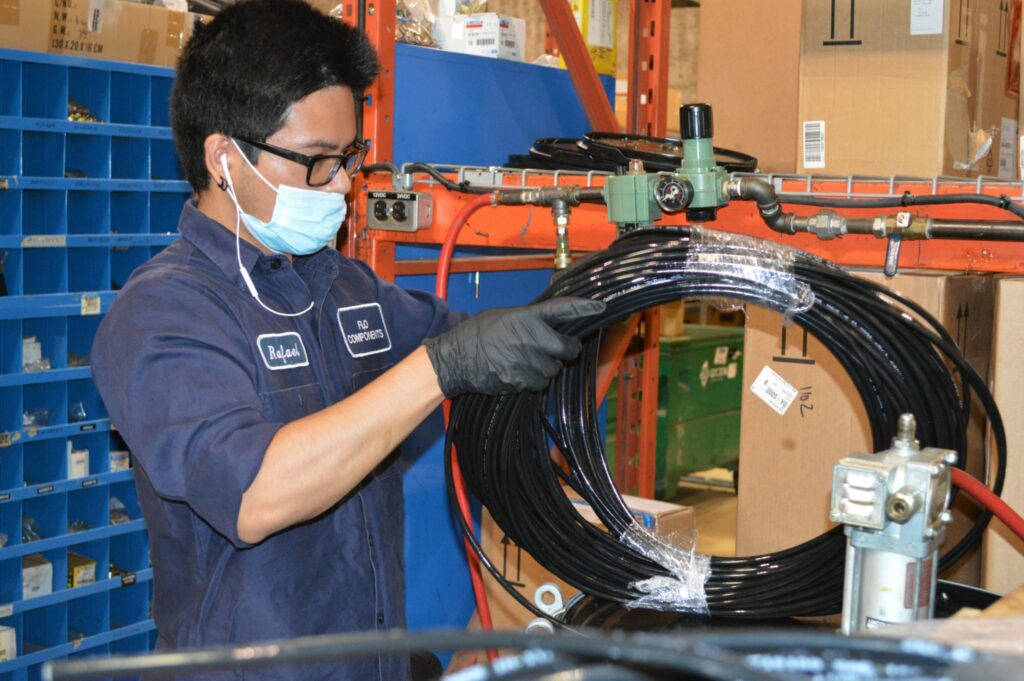Auto lube systems enhance safety, save cash
A little grease saves a lot of grief and money.
Safety is compromised if parts are not lubricated. Components begin to lose functionality or can have catastrophic failure in some instances. Costs add up quickly for parts, labor and equipment downtime.

“I know of a couple of fleets had problems due to a lack of lubrication, have had things like brakes going out of adjustment and getting fined for that,” says Frake Eisses, service manager at Lubecore International in Campbellville, Ont.
Automatic lubrication systems apply grease equipment optimally, resulting in less components going to waste and lower operating costs, Eisses says.
The biggest advantage of any type of lubrication system is the ability to lubricate the surface while it is moving.
Measured amount
“You know you are going to get a measured amount, you know you are going to get it in the right place at the right time. Any time you can lubricate a bearing while it is moving, it is more efficient lubrication,” says Mike Deckert, vice-president of Flo Components in Mississauga, Ont.
“You’ve got two metal-to-metal surfaces and the lubricant is the layer between the two. If you don’t have the lubricant there, you have serious wear. You can look at the cost of replacing kingpins. It might just be that, or you are on the side of the road, and it has snapped off.”
He adds that some companies that have auto lube systems say that because all the bearings and surfaces are being lubricated, they also save on tire wear.
Some people run a vehicle continuously and don’t bother greasing it, says Kamaljit Johal from Diesel Truck Centre in Mississauga, Ont. “They are trying to save money,” he says.
“If you don’t grease, it will cost you money, you may have a component failure or you may break down on the road and you will have to also pay for a tow.”
Kamaljit Johal, Diesel Truck Centre
Mechanic Johal says a grease job must be done between scheduled services. For those who do it, their equipment will last longer, but some people don’t bother.
“If you don’t grease, it will cost you money, you may have a component failure or you may break down on the road and you will have to also pay for a tow,” Johal warns.
Eisses says when too much grease is used, it is bad for the environment and equipment. “We are always looking out to make sure the environment is protected. We never want to put too much out there because grease is soap and oil. It also helps reduce component wear, making it last long, thus resulting in a net positive for the environment,” he says.

Deckert says with manual lubrication, you put in a certain amount, or pump it until you see grease come out. Within the first hour, 40%-70% of the lubricant is lost when applying grease this way.
Some people have the misconception that if they have an automated system, they don’t have to look at it anymore, says Gabriel Lopez, marketing specialist at Flo Components.
“You still need to do your daily walkaround and make sure the reservoir is full of grease and that no lines are broken off,” Lopez says.
An auto lubrication system takes the grease gun out of the mechanic’s hand and puts wrenches and a flashlight in it, Deckert says.

These systems only work if the user maintains it, Johal says. Also, if you use the wrong type of grease, the system will not function properly or stall.
Eisses says the lubricant that is dispensed is decided in-house at Lubecore. “We put a precise amount of grease in at a timed interval – every two hours typically, and that results in consistent lubrication, and you are getting a more effective working surface.”
He adds that when you have water wash-out, if it is raining or when there is brine on the road, by applying lubricant on a frequent basis with low volume, you will get the perfect film.
If you mix greases that are not compatible, they could go anywhere from becoming like concrete or turning soft and gooey and you lose protection, Deckert says. “Or you could shut down the system,” Lopez adds.
Fifth wheel
The jury is still out on greasing fifth wheels equipped with Teflon plates.
Deckert says if greasing will damage a fifth wheel, then don’t do it. “But if you have a little grease left over what’s it going to hurt?” he asks.
Johal has a different opinion. Never grease a fifth wheel with a Teflon coating, he advises.

Choose a grease that works with your system, Eisses says. In some cases, you get a grease with a very high base oil viscosity, which can be up to 600 centistoke in Europe. That grease becomes hard and it’s difficult to pump through a system during a Canadian winter, he says. “That is something to watch out for.”
Some companies in northern Canada run fluid grease all year round, but their trucks are covered in lubricant during summer and their yards are a mess, Deckert says.
Many companies use heavy grease in the summer and around October-November, they start putting a lighter or fluid grease in the cans which is compatible, so that when cold weather hits in January, all that heavy grease is gone, he says.
In spring, they change back over so that by summer the heavy grease is back into the system.
The future
Looking toward the future, yes, even greasing systems are becoming “connected.” Flo Components has launched FLOlink, a remote monitoring system that notifies fleet managers about low lubricant levels or if there is a fault in the auto lube system. It offers cloud-based information that can generate reports for analysis and planning.
Deckert says the device has a SIM card and a satellite version is being planned.
Have your say
This is a moderated forum. Comments will no longer be published unless they are accompanied by a first and last name and a verifiable email address. (Today's Trucking will not publish or share the email address.) Profane language and content deemed to be libelous, racist, or threatening in nature will not be published under any circumstances.
Yes, I agree with the greasing systems, as I still hear (truck stops areas) trucks
and trailers screeching due to lack of lubrication. I have been with one
company in the past that had a system in place and they worked awesome
as most trucks operate months out without seeing them back, as 99% of drivers
don’t grease them. I have been retired for ten years now, from driving, safety, and management positions but I still do dealer transfers and get involved with trucks…I wish all trucks get this system onboard…
GREAT ARTICLE!!!
HOWEVER!!
From my experience in the fleet world this isn’t always the case.
Auto Grease Systems ( no matter the brand) MUST be inspected properly. Not just look at the level and fill the resevoir.
You just can’t install it and not bring the unit in to inspect for ANY defects for a year and hope that the Auto Grease system works properly.
You need to ensure that all points are receiving grease and that it is the proper amount. Not just a little dot and no other evidence ( staining) showing.
I have seen loader pins seize solid and have to be “Arc Air ed” out when the Auto Grease system failed at that point and no one bothered to inspect the unit regularly.
I am currently running into a series ( a whole lot of) of flat bed trailers that are SPIF complient and the Auto Grease units are failing and due to the annual only inspection king pins are seizing and brake S – cams are seizing.
The main point is.. Just because you have an Auto Grease Unit installed DO NOT forgo routine/regular maintenance inspections.